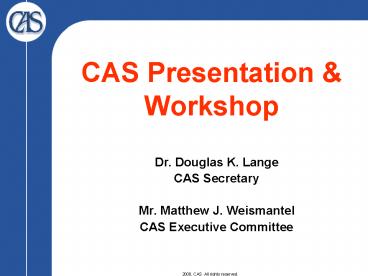CAS Presentation PowerPoint PPT Presentation
1 / 25
Title: CAS Presentation
1
CAS Presentation Workshop
- Dr. Douglas K. Lange
- CAS Secretary
- Mr. Matthew J. Weismantel
- CAS Executive Committee
2
(No Transcript)
3
CAS Characteristics of Individual Excellence for
Professional Practice in Higher Education
4
Laura Dean CAS Editor American College Counseling
Association Director to CAS The development of
student affairs as a profession
22
5
Professionalism in Student Affairs
- Are we there yet??
- Arguments have ranged from a disjointed group
of professions serving students to a sense of
professionalism permeating all activities in a
clear Student Affairs field - 2007 NASPA Journal devoted entirely to Student
Affairs Professionalism - Perhaps this is an internal struggle?
6
Criteria for Professionalism
- Professionals are employed full-time in these
roles - Established philosophy is in place
- Professional preparation exists with a body of
knowledge - Standards of practice
- Ethical Codes
- Professional organizations are in place
- Research is underway developing theories and
analyzing practice
7
Laura Dean CAS Editor American College Counseling
Association Director to CAS How can standards
help with the development of professionalism?
25
8
Renardo Hall President National Association of
Student Affairs Professionals NASAP CAS
Director How does CAS contribute to
professionalism within student affairs
professional associations?
26
9
Top Ten Reasons I Entered Student Affairs
- 10. It was either this or nuclear biophyisics
- 9. I cant get enough self-reflection
- 8. Newsprint and smelly markers are a great
obsession of mine - 7. People bug me, but I am constantly fascinated
by them - 6. I believe that Myers Briggs (MBTI) should be
an organized religion
- 5. The hours are flexible - you can work 80 hours
a week anytime you want - 4. I thought student affairs was something
sexual - 3. I enjoy the challenge of trying to tell people
what I do for a living - 2. How else could I re-live college for the rest
of my life - 1. To make a difference in the lives of students
who in turn will change the world (Susan Komives)
An adapted list by Susan Komives from an original
document created by a student affairs masters
class at Ohio State
10
- Accountability
Accountability is the obligation to demonstrate
and take responsibility for performance in light
of commitments and expected outcomes.
11
Standards and Outcomes
- Some outcomes maybe more salient to a
program/service than others but all should be on
radar - Critically important to think first of desired
outcomes and design programs that will get us
there - Standards, outcomes, assessment lead us to
accountability
- Standards serve a purpose in leading towards
intentional outcomes - CAS identifies 16 learning outcomes to address
the whole student - Each functional area either directly influences,
contributes or makes outcome possible
12
CAS Learning Development Outcomes
1. Intellectual growth 2. Effective
communication 3. Enhanced self-esteem 4.
Realistic self-appraisal 5. Clarified values 6.
Career choices 7. Leadership development 8.
Healthy behavior 9. Meaningful interpersonal
relationships
10. Independence 11. Collaboration 12. Social
responsibility 13. Satisfying and productive
lifestyles 14. Appreciating diversity 15.
Spiritual awareness 16. Personal educational
goals
13
Jan Arminio CAS President NACA Director to
CAS How can standards enhance student learning?
213
14
Jan Arminio CAS President NACA Director to
CAS Outline CAS contributions to student
learning?
214
15
- Self-Assessment the CAS Perspective
16
Why Assess??
- Preparation for accreditation
- Licensure - Certification
- Program Review
- Measure effectiveness
- Institutional self-studies
- Starting new programs
- Staff development
- Academic preparation
- Credibility and accountability
- Improve student learning
- Examine congruence with institutions stated
purpose - Performance budgeting
- Investigate programmatic concerns (access, cost,
changes) - Ethical practice
- Curiosity
17
Advantages of Self-Assessment
- Internally driven
- Supports staff development
- You are in the best position to evaluate your
programs and services - Recognition and rewards are local
- Develops a shared vision among constituents
18
Phyllis Mable CAS Executive Director CAS Past
President Former ACPA Director to CAS How did
CAS arrive at self-assessment?
1
19
CAS Fundamental Elements
- Quality is best determined by institutions own
people - Goals must be based on shared vision
- Use of widely agreed-upon quality indicators
- Reliance on honesty with meticulous evaluation
- Final assembling of results into a action plan
for improvement
20
Ground Rules for Self-Assessment
21
Phyllis Mable CAS Executive Director CAS Past
President Former ACPA Director to CAS Explain
the CAS self-assessment model
217
22
CAS Self-Assessment Process
23
Good Assessment
- Provides useful information
- Provides reasonably accurate information
- Protects student privacy
- Is systematic regular
- Is effective in terms of time, cost, etc.
- Charts quality program development
professionalism - Guides solid staff development
24
Practicing Self-Assessment
- Assemble Working Teams
- Review Standards Guidelines
- Adapt to Institution
- Design Process for Compiling Evidence
- Identify Quality Indicators
- Report Back
25
Council for the Advancement of Standards in
Higher Education
www.cas.edu
One Dupont Circle NW Suite 300 Washington, DC USA

